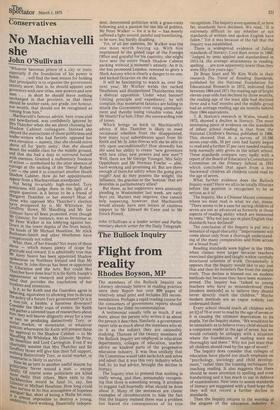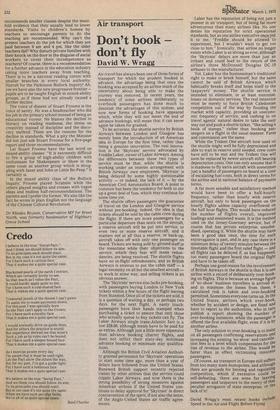The Bullock Inquiry
Flight from reality
Rhodes Boyson, MP
The members of the Bullock Inquiry on Literacy obviously believe in reading practice since their Report has over 600 pages of relatively small print and includes 333 recommendations. Perhaps a rapid reading course for the consumers of government reports should have been the 334th recommendation.
A testimonial usually tells as much, if not more, about the person who writes it as about the person it describes. Similarly, a government report tells as much about the members who sit on it as the subject they are ostensibly studying. Thirteen of the twenty members of the Bullock Inquiry are employed in education departments, colleges of education, teacher advice on kindred parts of the progressive education industry. It was thus unlikely that the Committee would take sackcloth and ashes and admit that it was this very industry which had, by its bad advice, brought the decline in literacy.
The Inquiry tries to pretend that nothing is really wrong, and then, presumably recognis ing that there is something wrong, it attempts to suggest half-heartedly what should be done about it. Many of the sentences are classic examples of circumlocution to hide the fact that the Inquiry realised there was a problem but feared the consequences of its true recognition. The Inquiry even queries if, or how far, standards have declined. We read, "It is extremely difficult to say whether or not standards of written and spoken English have fallen." Yet it was because of the fall that the Inquiry was established. There is widespread evidence of falling standards of literacy. Cyril Burt wrote in 1969, "Judged by tests applied and standardised in 1913-14, the average attainments in reading, spelling ... are now apparently lower than they were fifty-five years ago."
Dr Brian Start and Mr Kim Wells in their research The Trend of Reading Standards, published for the National Foundation for Educational Research in 1972, indicated that between 1964 and 1971 the reading age of bright eleven-year-olds had declined by three months, the reading age of the least able had declined three and a half months and the middle group had an average reading age six months behind their 1964 equivalents.
T. R. Horton's research in Wales, issued in 1973, showed a decline in literacy. The most interesting piece of evidence on the standards of infant school reading is that from the National Children's Bureau published in 1966.
This showed that in a survey of 10,596 seven-year-olds, 10 per cent had barely begun to read and a further 37 per cent needed reading help normally only given in the infant school.
These standards compare very badly with a report of the Board of Education's Consultative Committee on the Primary School in 1931 which concluded that apart from a few 'backward' children all children could read by the age of seven.
What further evidence does the Bullock Inquiry want? Have we all to be totally illiterate before the position is recognised to be as serious as it is?
The Inquiry, like a Chinese Maoist comment where we must read in what we Can, states: "There seems to be a case for saying children of seven are not as advanced as formerly in those aspects of reading ability which are measured by tests." Why not just say in plain English that standards have declined?
The conclusion of the Inquiry is put into a sentence of equal obscurity: "Improvement will come about only from a thorough understanding of the many complexities and from action on a broad front."
Reading standards were higher in the 1930s when classes were larger because teachers exercised discipline and taught within carefully structured schemes of work. Occasionally it appears that the Inquiry would like to say just thatand then its members flee from the simple truth. Thus decline is blamed not on modern methods but because they have been misinter preted. The Inquiry has "talked to young teachers who have so misunderstood them [modern methods] as to believe they should never directly teach the children." Maybe modern methods are so vague nobody can understand them!
Every school should teach all children with an IQ of 70 or over to read by the age of seven or it is causing the ultimate deprivation to its pupils. Yet the Inquiry states, "We would not be so unrealistic as to believe every child should be a competent reader at the age of seven, but we would certainly be unhappy with a situation where the foundations of reading were not thoroughly laid there." Why not just state that all children should read by the age of seven?
The Inquiry does consider that colleges of education have placed too much emphasis on "psychology, sociology and child development," rather than the training techniques for teaching reading. It also suggests that there should be more attention to spelling and even handwriting and it has much to say in defence of examinations. New tests to assess standards of literacy are suggested with a fond hope that they will not record a further decline in standards.
Then the Inquiry returns to the worship of the slogans of the education industry. It recommends smaller classes despite the manifold evidence that they usually lead to lower standards. Visits to children's homes by teachers to encourage parents to do the teaching are recommended. Why can't the present teachers do the job for which they are paid between 9 am and 4 pm, like the older teachers did? Why disturb private families with their knock on the door in the disguise of social workers to cover their incompetence as teachers? Of course, there is a recommendation
for a further advance in the education industry taking more teachers away from teaching.
There is to be a national reading centre with smaller branches in every local authority. Hurrah for the Parkinson Bullock Inquiry! Ah, yes we have also the new progressive frontier — pupils are to be taught English in mixed-ability groups, as if these had not already caused a further decline.
The voice of dissent of Stuart Froome is the voice of sanity. He was a headteacher who did his job in the primary school instead of being an educational voyeur. He blames the decline in literacy on reading readiness, the stress on creativity instead of discipline and the discovery method. These are the reasons for the decline in standards. What a pity the Minister did not just ask Stuart Froome for a five-page report and three recommendations. Let Stuart Froome have the last word on mixed-ability classes: "It is extremely difficult to fire a group of high-ability children with enthusiasm for Shakespeare or Shaw in the same room as another group which is struggling with Janet and John or Little Bo-Peep." It certainly is. In the mixed ability class of the Bullock Inquiry, Froome played Scrabble while the others played noughts and crosses with vague ideas and endless half-recommendations. The parents and I prefer the former. We also like the fact be wrote in plain English not the language of the Chinese Cultural Revolution.
Dr Rhodes Boyson, Conservative MP for Brent North, was formerly headmaster of Highbury Grove School


































 Previous page
Previous page